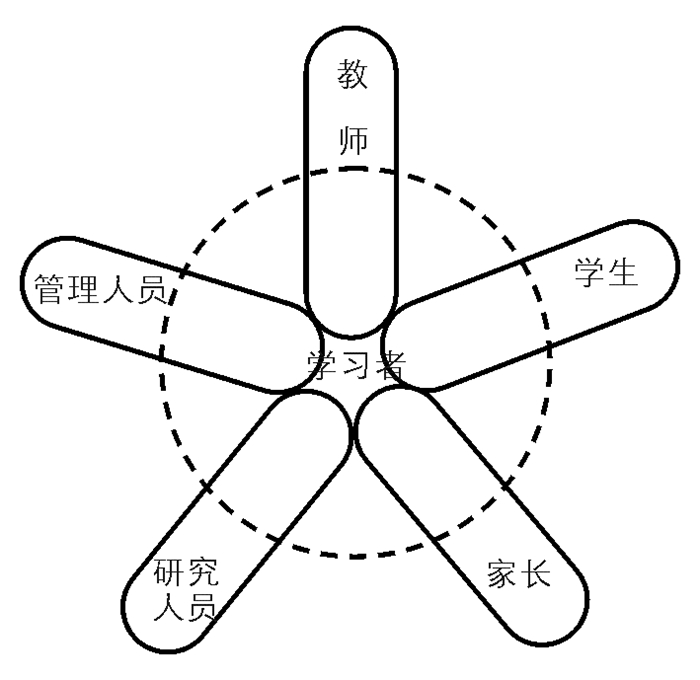全文HTML
-
中小学教育是基础教育的核心,中小学是实施义务教育的主要阵地,也是教育教学研究长期“深耕”的场域。当前,中小学生的学习环境已经历了时代背景和学生代际特质的多维变化,中小学生的“学情”也发生了前所未有的改变。尤其是新冠肺炎疫情暴发以来,“停课不停学”等教学变革的普遍发生、发展,使得一个重要命题——学生“形式主义的学习”——被师生广泛提及。这一命题兼具历史背景与时代特征,需要在教育理论与实践取得空前发展的当下,展开历史与现实的梳理以及诊治。
-
2019年底,一场突如其来、肆虐全球的新冠肺炎疫情给教育领域带来了史无前例的变革,中小学线上教学得到普遍应用。至2020年9月,我国在世界新冠疫情仍然严峻的背景下,通过党中央的坚强领导、全国人民的协同努力,率先实现了全面复学,当年中高考有序举行,中小学生如期开学。至今,全国上下已普遍实现复工复产复学。此时,线上教学以及信息技术对教育的渗透和重构已经前所未有地嵌入至教育现实和深层观念之中,使教育生态经历了一次深刻变革,亦激发了人们诸多未尽的思考。当前,我国抗击新冠疫情已取得重大胜利,疫情防控进入常态化,教育步入“后疫情时代”。总结疫情阶段教育实践的经验和不足,为后疫情时代的教育谨慎谋划已成为当下之必须。
疫情期间在线教育主要通过电视频道、网络平台等媒介展开。“停课不停学”的相关政策安排为疫情期间维持教育教学秩序、确保教育进度、促进教育信息化发展等,提供了重要保障,为世界抗疫期间的教育贡献了中国经验。然而,也存在亟待破解的问题。其中相当具有代表性的问题即是“形式主义的学习”——学生的学习只是在表面上遵从线上教育的程式安排,学习的实质效果和品质并未提升,甚至产生了消极的学习体验。
-
学生“形式主义的学习”并非独属于网络时代,也并非孤立地、无根据地突显,而是具有一定的阶段性特征:
-
我国老一辈物理教育研究者刘铁铮①于1957年即提出和概括了“学生形式主义的学习”及其成因。他以中学物理学习为例,认为学生形式主义的学习即学生“虽然愿意把物理学好,也花了不少时间和精力,可是学习的效果往往不能令人满意”,以至于“在物理知识上是一知半解、支离破碎、知其然不知其所以然。……往往自己觉得在课堂上听懂了,就是不会算题,对问题缺乏分析的能力,普遍存在着乱套公式现象”[1]。应该说,这一概括仍然非常适用于今天的教学实际。物理学作为一门知识结构化程度较高、科学方法规范的严格科学、精密科学,教学实践中出现的“形式主义学习”具有很强的代表性。在教育资源相对匮乏的情况下,学生的知识学习普遍存在机械、片面、远离实际的问题。
①系我国著名物理教育专家,北京师范大学阎金铎(1931-2018)先生的中学物理教师。
-
近年来,信息技术的发展带来了学习资源的丰富、终身学习理念的传播以及学习者自主能力的不断提高,学习不再局限于学校教育和“家庭作业”。然而,学习环境的深刻变革也直接或间接地导致了学习的危机,如时间的零碎化、计划的随意化、内容的浅表化、注意力的分散化等。
“碎片化学习”是对于信息技术普及时代学习弊病的又一形象概括[2]。传统学校教育也由此受到相应挑战:如何面对手机、平板电脑等新设备?如何应对学生日益分散的注意力、日益提升的“兴奋点”以及日益增多的信息储备?一旦不能正确应对,学生的“假装学习”就会普遍地呈现于课堂上——虽然师生都服从课堂学习的流程安排,但是“学习”并未真正发生,教育成效难免大打折扣。
-
学习兼有形式与内容两个方面,符合辩证法一般原理。形式与内容相辅相成、相反相成,共同形构了学习的本体。“形式主义的学习”并不等同于“学习的形式化”或“对形式的学习”。学习原本具备“形式化”的方面,并且形式化的具体样貌与水平构成了学习质量的组成部分。然而,当学习的形式被片面关注,进而异化、破碎,以至于形式与内容脱离,学习就成为了“形式主义的学习”。这样的学习只顾表象不顾本质,最终失于功利与主观。如是,“形式主义的学习”这一概念穿越教育发展的过往和现实,较“形式化学习”等表述更为准确和辩证,兼具历史性与时代感,需要在新老矛盾交织的当下被合理聚焦。
对学生形式主义的学习需要从多个侧面加以把握,以洞察本质、探明成因。疫情期间,学生“形式主义学习”的出现并非绝对偶然,而是在线上教育首次大规模、有组织、普遍性开展的背景下,“形式主义学习”的新旧问题随着线上教育的规模化而规模化地叠加了。调查显示,“停课不停学”期间,暴露出“很多地区、学校缺乏因地制宜的思考和设计,缺乏科学性和针对性”“没有对不同层次、不同学科的授课内容进行综合的考虑、评估和设计”“较难实现对学生学习情况的实时监管和综合评估”“各类主体信息化能力不足”等问题[3],以至于师生和家长都普遍感到焦虑。在线上教学中,一旦师生互动受阻,教师在网络终端看不到学习反馈,而责任被片面地归于学生,学生的学习就容易被指斥为“形式化的学习”。并且,信息技术越强大、越发达、越“热闹”,就会愈加反衬出“学习形式化”。后疫情时代,线上线下混合教学将是常态,“形式主义学习”问题迫切需要找到破解之道。
一. 中小学生“形式主义学习”的界定
二. 早期“形式主义学习”的特征
1. 特征之一:学校课程的机械式“浅层学习”
2. 特征之二:网络时代的碎片化“假装学习”
三. 在线教育中的“形式主义学习”是新旧问题的规模化叠加
-
应该说,我国教育者对学生“形式主义学习”的概括是鲜明而具体的,与教育理论和实践存在双重的张力,具有“掌握群众”的概念力量,因而可作为后疫情时代推进教育教学改革的一个重要视角。在描摹了不同时代背景下形式主义学习的表现之后,需要进而探明后疫情时代其多方面的成因:
-
造成“形式主义学习”的首要原因是教育质量发展与学习需求不适应。形式与内容辩证相倚,矫治形式主义的学习除了在形式本身上下功夫外,还应重视包括教学方法、学习指导、个性化在线教育资源等在内的内容建设与提升。在常规意义上,优质资源不足是形式主义学习产生的根本原因,由此学习就不免沦为虚假的、形式化的学习。对疫情期间线上教学的调查大多印证了这一点。例如对湖北省的相关调查显示,82.83%的教师难以远程监控学生的学习状态,这是在线教育遇到最大的问题:“师生在物理空间分离的情况下,由于学生的学习态度、自律能力以及意志力存在差异,导致部分学生出现上课注意力不能集中、开小差以及对待作业不认真等现象。此外,59.71%的教师反映课堂互动不充分。”[4]由此足见,在教学质量难以保证和提升的前提下,学习很容易沦为形式主义的学习。
在教育内涵发展处于一定水平时,亦不能企求每人、每时的学习都能达到形式与内容统一。形式主义的程度是发展变化的,会随着教育质量的提升、教学改革的推进而发生变化。不能企求任何时候都不存在形式主义的学习,但一旦出现这类现象,则应及时加以诊治。后疫情时代,应科学认识教育质量及其与其他方面的关系。要更加科学地认识学习本身,辩证把握学习的关键环节与要素。
-
反对形式主义的学习不等于反对学习的形式。教育、学习的形式不仅不可或缺,而且在一定意义上蕴含着达成教育高品质的可能。例如,近年来国家出台的相关文件对“仪式教育”提出了明确要求:“积极开展党团组织活动和主题教育、仪式教育、实践教育等活动。”[5]“仪式”作为特殊的“形式”,本身具备教育的功能[6]。通过“仪式”可以使学习者产生具身认知,促进其身份认同与转变。
形式主义的学习源于对学习中仪式的误解与错失,也就是让学生经历了失败、低劣的仪式。不论在线学习还是课堂学习,都存在不同的“仪式”。对仪式要素的破坏和剥夺,无疑都会造成失败的仪式。诚然,在线学习为程序的简化与时空的便捷提供了条件,然而也容易导致大量的仪式要素与过程省减。有学者指出:“在线教学中,时空分离的本质决定了教学实践的关键是如何实现教与学的再度整合,这依赖于以媒体为中介的教学交互。但如果缺乏互动,就会导致学习者产生孤独感,阻碍在线学习的参与度。”[4]在线教学的整合与交互不能仅依靠物质手段,人类的“仪式”文化和传统应该被加以谨慎考虑。
另一种更为普遍的现实是,“应试教育”已然成为一种“仪式”,送考、冲刺、誓师、跑操,等等,已在“高考工厂”中沉淀为一套庞大而又未经充分反思的仪式系统。其中是否存在“形式主义的学习”,亦值得研究。
实现高质量教育无法回避高质量的仪式构建。任何真正的学习都需要通过“仪式”,这种仪式不是刻意、蹩脚、违反仪式美学的,而是与生活融合,能实现春风化雨、润物无声的教育境界。仪式与形式(化)的界定提示了中国传统教育中自律、修养、涵泳、知行等学习文化的时代意义。在教育资源空前繁荣、获取渠道空前便捷的在线教育时代,“修习功夫”的学习传统有必要再次合理植入教育制度与文化之中。
-
“形式主义学习”存在的原因还包括这一现象本身的迷惑与误导性,也就是使人误认为“形式主义”并未发生。形式主义学习之所以存在,一种原因恰是因为人们的学习观、教育观是“形式主义的”。肤浅、片面地关注形式,以形式管理替代内容管理,“形式主义的学习”就涌现出来。然而,“形式主义的学习”也确乎能符合“形式主义的评价”,正如“题海演练”确实能迅速“提分”,但牺牲的则是学生的全面发展以及教育的社会文化功能。
教育话语体现着教育思想、影响着教育行为。教育话语本身的复杂交叠容易导致理解的迷思,进而也将在相当程度上造成“形式主义的学习”。在教育领域,复杂性似乎永远是首要的现实,任何对其的漠视与轻视,都将引来复杂性的反噬与反扑,从而再次为“复杂性”增加注脚。不仅干预教育的各种行为需要小心翼翼,而且对教育的任何“喊话”也必须慎之又慎。事实上,当立于我国教育发展的地平线上,如果足够审慎,则也有可能为教育乃至社会发展打开新的窗口。如果将前述的“喊话”视为教育领域的“话语实践”,则可以在这一视角下,看到历史与现实中的诸多新老疑难问题。而当破解乏力之时,或许就需要引介新的元素。
话语实践(discursive practice)在福柯那里几乎等同于“话语”本身。福柯指出:“话语的实践”不同于个体表述思想、愿望、形象等的表达行为,也不同于逻辑推理和语法的构造行为,“话语实践是一个匿名的历史的规律的整体”[7]。也有学者将话语描述为“一种实践中的语言,它围绕特定的主题展开,并推理性地形成言谈对象的意义,具有价值负载并承载权力关系的特点”[8]。当前,亦有学者将教育理论的话语实践作为通达教育实践之路,认为“话语实践思想为解决教育理论不能融入日常教育实践的问题提供了一条现实的路径,即通过把教育理论转化为教育实践领域的话语可以实现教育理论对教育实践的整体建构”[9]。诚然,教育领域已不乏好的理论/理念,亦有诸多好的实践,然而困难与困惑之处,恰在于理论对实践的亲和、实践对理论的反哺以及有限的好的“理论-实践”如何化作制度与文化形态。基于此论,当前的教育话语实践问题着实应在总体的教育意义上展开研讨。教育的话语实践是重要的,不仅缘于教育本身的重要性,还在于教育在任何时候都应是社会文化整合、发散的枢纽。
在传统上,我国教育领域一直存在学生“主体”问题、以学生为“中心”等教育话语的争论①。就二者的关系而言,“教育主体问题的讨论,是由来已久的‘教师中心论’与‘学生中心论’之争的继续”[10]。现实中,不论教育理论如何更迭,“教师主导,学生主体”,“尊重学生的主体地位,发挥教师的主导作用”都已然是一线教育工作者口中的常用语,并以极大的惯性左右着教育实践的发生与发展,以至于几乎任何对教育的重要改革都无法回避对于“主体”“中心”等话语的理解、阐释以及实践。
① 1979年9月15日,于光远提出了“教育认识现象学中的‘三体问题’”,即作为认识过程的教育活动不是简单地处理“认识主体和认识客体之间的‘二体’问题”,而是要处理“教育者、受教育者和环境之间的‘三体问题’”。此视为改革开放以来教育“主体”问题争论的肇始。此后,争论中出现的主要观点有:教师惟一主体论、学生惟一主体论、双主体论、主导主体说、三体论、主客体转化说、复合主客体论、过程主客体说、层次主客体说、主客体否定说等。进入20世纪90年代,“主体”问题的思想脉络中出现了“主体性教育理论”等比较系统的理论成果以及“类主体教育论”“教育人学”和“主体间性教育论”。所谓“主体间”(或“主体际”),强调的是“在交往与对话中建构主体”(参见:宋剑.我国主体教育理论发展的历史进路[J].教育研究与实验,2011(1):30-34.)。认为“主体间性中主体与主体的关系实现了对主体性中主体与客体关系的超越,他者性中他者的绝对差异性、‘面对他者’的责任实现了对主体间的同一性和互惠性的超越。”(参见:冯建军.从主体间性、他者性到公共性——兼论教育中的主体间关系[J].南京社会科学,2016(9):123-130.)
应该说,几十年来,我国学者关于教育主体问题的研讨体现了相当的教育研究本土意识和学理自觉,然而这并不代表“主体”话语实践已不存在困惑。有学者论及了“主体性教育”的“话语困境”(参见:何巧艳.“主体性教育”的历史语境与话语分析[J].山西大学学报(哲学社会科学版),2016(3):74-79.)。亦有学者指出了“教师主体性缺失”的问题(参见:和学新. 主体性教学论[M]. 兰州:甘肃教育出版社,2001:29-30;贺慧敏.教师主体性研究综述与展望[J].教师教育研究,2019(1):107-112.)。
教育领域关于“主体”“中心”等话语的实践历程,既折射教育思想与实践,也承载或呈现一些尚未破解的难题。“主体”“中心”话语虽然处于理论与历史的不同层面,但在话语实践的意义上,则必然发生碰撞、交叠,回响于共同的场域。这样的“多重回响”是后疫情时代面临的基本现实。线上教育的推行将与“主体”“中心”等既有教育观念产生更多、更为复杂的纠葛,进而可能引发“形式主义的学习”泛滥。对此,更具总体性的教育思考是必要的。
一. 教育质量带动不足是“形式主义学习”的根本原因
二. 教育仪式营造失败直接造成“形式主义学习”
三. 教育“话语实践”的多重迷思为“形式主义学习”深层原因
-
无论在历史还是现实中,形式主义的学习与任何的形式主义一样,都存在危害与风险。在总体上,形式主义的学习与实事求是的科学精神背道而驰;具体而言,形式主义的学习将在课堂这一根本环节架空关于中小学教育的一切设计与安排,从而使得任何教育发展无的放矢。对于新时代的基础教育而言,放任“形式主义的学习”将造成多方面的教育“病变”。
-
立德树人是我国教育发展的根本任务。2018年,习近平总书记在全国教育大会上强调:凡是不利于实现这个目标的做法都要坚决改过来。而“形式主义学习”会严重阻碍立德树人落到实处。在目标上,形式主义地迎合目标将造成形式主义、痕迹主义;在过程上,形式主义的学习假装其形而无立德树人之实,并表现出迷惑性;在育人成果上,形式主义的学习将造就行为敷衍、善于迎合的特质。推而广之,形式主义学习的演化将助长浮躁的学风、世风,产生广泛危害,必须及时矫治。
-
党的十九届四中全会将推进国家治理体系与治理能力现代化作为重要目标。推进教育治理体系、治理能力现代化也是《中国教育现代化2035》的内在要求。但教育事业内在的规律性及教育的特殊复杂性,使得教育治理的难度相应提高。高品质的教育治理体系对于防治“形式主义学习”等典型教育问题,应该有更规范的体系设计,体现出更多的优势。
“形式主义学习”需要的教育治理更加特殊。在教育治理中,被形式主义阻隔的教育治理无法真正开始;对形式主义学习的失察与失控也必然推高治理成本,影响治理效力。就此而言,教育治理的落实与教育规律的把握不应脱离,从微观到宏观的教育现实与必然性,需要教育治理体系在构建中谨慎探查。
-
我国基础教育发展已进入质量发展与内涵提升的新阶段,机遇与挑战并存。形式主义的学习有鲜明的时代性,但也沉淀着历史,具有层级不同而又相互联系的机理。因此,育人质量的提升并非一项“线性”达成的任务,而是一个复杂的、非线性的过程,在建立标准、提供保障等之外,还应专门进行风险防控。形式主义学习的存在既误导育人,又阻隔治理,势必阻碍基础教育质量提升。
2018年全国教育大会召开以来,国家先后出台了系列文件,为全面提高教育质量进一步提供政策保障。相关文件中首次提出了“关注育人关键环节”的新要求。例如2019年出台的《教育部关于加强和改进新时代基础教育教研工作的意见》指出,“加强关键环节研究”,包括“加强对课程、教学、作业和考试评价等育人关键环节研究”[11]。“育人关键环节”正是一直以来易于忽视的盲点,从而也容易成为“风险点”。这些文件为解决形式主义学习等复杂教育问题提供了重要指针。
一. 导致育人虚化:不适应立德树人根本要求
二. 造成治理烟幕:不适应教育现代化的目标
三. 阻滞质量提升:不适应基础教育发展新阶段
-
“学习者中心”是线上教育时代标榜的鲜明理念[12]。后疫情时代必然是线上教育更加繁荣的时代,因而必须对“学习者中心”这一理念作充分的澄清,从而规避“形式主义学习”的风险。首先,关于“学习者”有三个问题需要深思:“学习者”是什么、“学习者”都有谁、如何成为“学习者”。
-
个体并非天然的“学习者”,“学习者”不能直接而不加分辨地指代个体。如果在“主体性”等未尽的话语实践问题上,坚持总体性的教育思考,则有理由择取文化性思路。诚如石中英教授所言:“关于‘主体教育是什么’的言说是一种批判性的话语……它所阐述的、追求的都不是形而下的一些事实性、操作性的东西,而是建立在教育认识论、价值论和实践论批判基础上的形而上的一种理想,一种标准,一种境界,而且是永远有待于完善的理想、标准和境界。……主体教育是一种站在教育立场上的新文化建设。……它是一种真正的学生观、教育观、文化观的变革。它与一般的实验不同,不为了证明一种什么东西是有效的,而是为了创造新的价值、新的文化、新的人类。……对‘主体教育是什么’的追问、言说和沉思也必定会突破教育学语境,在一个非常宽广的社会的、历史的、哲学的、文化的等语境中进行。”[13]如果说“总体性”的教育、文化思考是对当下尤其纷繁复杂之教育现实的应对方式,那么文化的进路则有其优势和必然。
在文化意义上,“学习者”是一种“身份(identity)”,个体对身份的认同需要一个文化心理形成过程,即“文化身份”的确认与建构。文化身份是教育话语实践背后更深层的机制,也是教育本身的一个机理。因为“身份”也关乎个体对“自我”的觉知,是“自我”的符号化。“只有将自我与世界保持距离,才能在整个当代文化中寻求到一种意义的新鲜感。只有洞悉符号的重复和累加,看清符号本身的复制与更新,自我才能在意义的洪流中形成一种超越的哲学,即符号自我可以悬隔外在世界中的意义重负。总之,自我始终处于动态变化的过程,主体符号学也需要不断突破框架的束缚,与主体本身的发展相呼应。”[14]概言之,“学习者”不是人本身,也不是单薄的符号,而是文化建构而成的身份。
-
当下教育领域的复杂性还体现为各种割据与对垒。师生、生生、家校、亲子等关系问题,甚至学校与社会的关系,都凸显了新旧难题、多重矛盾。如果片面持有“主体”“中心”等观念,则无疑会加剧对垒,从而使整个教育场域生发裂解的风险。在这一背景下,作为教育场域有可能最具包容性的身份——“学习者”,应该被明确地加以标识。
如图 1所示,在教育场域中,“学习者”身份并不仅仅属于学生,学生、教师、家长、研究人员、管理人员——“大家”——都是“学习者”,他们共同分享着“学习者”的文化身份。但各群体或个人并不是自然地、自动地拥有“学习者”身份,其间有着一个“身份认同”的机理与过程。
以往的论述中也有关于“学习者”的内容,但绝大多数仅将学生作为“学习者”,并没有意识到“学习者”是一种“文化身份”,且并非学生所独有。事实上,学生虽然在学习,然而可能并未认同学习者身份,从而无法融入一种更为丰富的学习文化。对于教师而言,专业发展、终身学习要求教师必须开展主动学习,更遑论“教学相长”的古训在前。进一步而言,教师需要将自己的学习置于“学习的历史文化与社会境脉”之中,将自己视为“学习者”的一分子。从时代意义上而言,当下无疑为教师、家长抑或研究人员、管理人员都提出了更多的“学习”命题,他们都应认同“学习者”身份,然后才有可能真正进(浸)入教育场域。
-
“学习者”文化身份的标识与建构对实现教育领域的总体性文化功能具有重要意义。“文化认同”即“文化身份认同”(cultural identity),“是指某个文化群体成员对自己的成员身份(文化归属)的认同感”[15]。“学习者”文化身份的提出打开了教育的新视野,将一个兼具历史传承性、共同价值性、发展建构性的过程揭示出来,使教育关怀延伸至细微处。
教育场域的复杂矛盾、裂解风险,在共同文化身份的关照下,都可能得到消解与弥合。共同的文化身份保证共同的文化认同,这为一种“基本信任”提供了前提,从而将更好地促进教育相关者的自我认同。社会学家吉登斯的自我认同理论将“基本信任的获得”作为获得个体本体安全感的一个必要的条件:“基本信任培养起来之后,本体安全感的核心就建立起来了。”[16]
现实中,有研究者指出,教师群体存在“有角色感而无身份感”的现实[17],其中也包括教师教育者等群体[18]。“学习者身份”能提供这样的“身份感”,并且与学生的身份在新的意义上统一起来,从而有助于师生关系在深层意义上的联结。也就是说,共同的文化身份也可促进“主体间性”的实现。有研究者认为,“主体间解释”的实现需要“共同意义域”的建构[19]。学习者文化身份则具备这样的建构功能。现实中,也有致力于建构“学习共同体”的努力,而共同体在根本上需要共同的身份(认同)来维系和滋养。学生、教师、管理者、研究者只有共享共同的文化身份,才能塑造更为广阔而活络的共同体,从而使学习者不再只是个体性存在,而成为共同体的有机组成。
一. “学习者”是身份而非标签
二. 包括学生在内的“大家”共享“学习者”身份
三. 成为“学习者”需要通过“认同”过程
-
“学习者”文化身份的标识与建构为突破“形式主义的学习”提供了条件与前提,应进一步明确的则是“以学习者为中心”的意涵。需要回答的问题包括:“以学习者为中心”与“主体”的关系是什么、“以学习者为中心”的本质是什么、“以学习者为中心”指向怎样的教育方向。
-
以往的观念往往在“主体”的所指上更动,然而频繁、随意地更动势必助长对垒与分裂。应看到,无论在教育意义还是哲学意义上,“主体性”的获得都不是天然或一蹴而就的,而是一个有条件、有要求的过程。关于“主体”的教育话语实践必须有利于彰显这种过程性和条件性。
“学习者身份”应被作为“主体”的条件,这意味着认同学习者身份的人才能成为教育领域的“主体”,认同与建构学习者身份的过程也是主体性获得的过程。这种界说方式避免了主体性“一蹴而就”的印象,将过程性的方面通过文化身份的“显微镜”凸显出来,从而有利于教育。在实践中,无论是学生、教师、家长、管理人员还是研究人员,认同“学习者”身份,就可能成为“主体”;也只有认同学习者身份,才可能成为主体。
明确“学习者身份”是“主体”的条件,还有助于通过互动走向“主体性”的真正达成。“‘身份’是人的一种主体意识。……身份是任何自我发送符号意义或解释符号意义时必须采用的一个‘角色’,是与对方、与符号文本相关的一个人际或社会角色。……就一个个体的人而言,执行自己身份(‘我是谁’)的是(具有自我意识和构建能力的)主体,而符号是其手段,社会角色是其准则。主体之所以是执行者,是因为他自身的构建能力,即主体性。‘主体性’是言说者或行动者把自己建构成一个主体的能力。而主体性则总是指主体有关身份的某种程度上的思想和自我意识。……主体性依附于身份的确立,不同的身份认同会导致不同的自我意识和行为体验。身份属于相对稳定和连贯的文化属性,而主体性则是变化和流动的思想和意识。”[20]由此足见,“主体”与“身份”有着密切的互动关系,可以相互构成与促发。
-
长期以来,教育领域的“中心”话语直接指向教师、学生等群体或个体,不免显出一定程度的飘忽、刻板和绝对化。为改进这一现实,“身份”应被作为“中心”话语的操作对象,从而有利于“中心”话语获得更多的、有“弹性”的诠释空间,并对“中心”的操作提供一重“身份”的防范,缓解教育中可能出现的刻板和焦虑。
教育领域应以“学习者”为中心,以塑造、认同“学习者”身份的活动和过程为中心。在实践中体现为,教育是学生、教师、家长、管理人员、研究人员等每一个体认同学习者身份的过程。除学生外,只有使所有的教育相关者都认同“学习者”身份,才更有利于教育的展开与教育目标的达成。
“以学习者为中心”富于教育智慧,契合教育特质。诚然,每个学习者之间绝不是完全一致的,学习者也有成熟、高下、类群之分,然而当下则绝对有必要强调共同的身份“认同”。以“认同”为“中心”,即是一种教育性的选择。教育的“中心”不是区隔的牢笼,不是绝对的优越,而是有条件地敞开与拒绝。也正是在敞开与拒绝之间,教育活动的时机得以体现,“中心”也成为了具有内在张力的文化“聚合-发散”之“心”。由此,教育的总体性文化意味也得以生发。
-
在学理意义上,意在解构的“话语实践”与意在建构的“叙事”是背道而驰的两种活动。然而教育话语实践如果坚持教育性,则必须将解构与建构结合起来。“学习者”不是空洞的符号,而是承载、包孕着意义的叙事。在更深广的文化意义上,“以学习者(身份)为中心”,就是以“学习者”作为“故事线(storyline)”的一套“文化叙事”。后疫情时代的教育应着眼于这一高度。
“学习者”的文化身份不是任何“简明”的“定义”所能充实的,必须由学习者加入一种文化的叙事,从而真实地承接意义、感受认同。有学者试图建设一种“学习共同体”,以超越“主体性神话”[21] ①然而需看到,共同的“学习者文化认同”才是“共同体”构建的深刻根源,并且文化身份结成的“共同体”绝不限于一时一地的课堂,而是能够神交古今中外,进入历史文化之维——这是一个文明大国之教育的应有气象。
① 21世纪初,日本佐藤学教授《静悄悄的革命》一书译介至我国,其系列观点开始对我国一线教育产生影响。令众多读者印象深刻的是,该书的立论与展开是从批判“主体性”开始的。首章第一节即题为“教室里的风景——关于‘主体性’神话”。作者通过对所观察的教学活动的概括,指出很多强调“自己解决”“自我实现”的教学活动都“是一种将学生的‘主体性’绝对化的倾向,现在所有的教学中几乎都能看到这一倾向。”在“悬在半空中的主体”部分,作者认为:“‘主体性’神话是在将教学中的‘自学自习’理想化,将‘自我实现’或‘自我决定’等理想化之后产生出来的。”自以上观点引入以来,已得到诸多教育工作者的呼应与认同。应该说,佐藤学对日本本土“主体性神话”的批判具有针对性,之于我国一些教育教学现实亦有相当的可迁移性。然而“主体性”本身的价值与内涵不应在批判中受到遮蔽与污名化。因而,这里需要更谨慎的话语实践。。
世界上许多文明、许多国家均有优秀的学习者及其文化。可以说,有学习者文化的文明才是有主体性的文明,有学习能力的人民才是有主体性的人民。学习能力是一个国家、民族生生不息的重要源泉,失去学习能力的民族必将失去生命力。
在世界民族之林中,我国的学习者以及学习者文化尤其引人瞩目。对我国教育而言,“中国学习者”的文化叙事是中国整体文化历史的一部分。在中国文化传统中,学习是人之为人的责任,是自省、向道、奋发、竞争、合作与开创。学习是顶天立地的行为,不可将其作任何矮化。概言之,“中国学习者”是有国家、民族、人民主体性的学习者,是有中华文化自觉的学习者。从外延上来说,中国历史上为救亡图存、国家发展、民族团结、文明赓续创新、科学探索、文化交流做出贡献的,都是中国学习者。
教育领域应通过“学习者”文化身份的构建与认同,冲破各种阶层、标签、亚文化、思维定势、刻板印象(包括线上线下)等带来的区隔与分裂,赋予人们一种贯通历史、覆盖社群的文化身份,将学习者导入“中国学习者”的文化历史洪流,从而铸造国家与文化认同的教育之“锚”。
应在教育中呵护、保留一种特殊的身份。如果一个国家还需要教育,如果一个国家历来重视教育,如果一个国家的人民需要终身学习,如果每个个体有必要自强不息,那么就要在教育中拂去一些“乱花渐欲迷人眼”的标签,融入一种教育所给予的、伴随一生的教育性、文化性身份——学习者。在这个意义上,“学习者文化身份”的澄清与认同具备了总体性的历史文化意义:应努力使“学习者身份”认同成为当代中国人生命成长的途径,成为中国社会涵育生命力的源头。
一. 主体性并非天然拥有,“学习者(身份)”为“主体”的条件
二. 学习即认同学习者身份的过程,“学习者中心”的本质是以“学习者身份”为“中心”
三. 认同“学习者”身份存在高阶维度,其敞开与通达的方式是共同体的文化叙事
-
后疫情时代,“学习者中心”观要求构建整体育人的学习环境。学校、教师、家长、社区、社会、媒体、机构及企业等都责无旁贷,都应塑造、维护共同的学习者文化,促进学生认同学习者身份。德智体美劳全面发展是新时代教育方针的明确要求,“五育”亦是有机的整体,指向培育全面发展的人。这就是中国学习者在“新时代”的面貌。全面发展的立场既是宏观的指针,也是微观的规律。对学习者的指导应进一步整合课程、教材、作业、评价等环节,为其全面发展提供条件。
在具体教学操作中,应着眼于教学设计、教学技能、教学互动等基本教学要素,发挥学科本身的深厚育人价值,彰显教师在教书育人中的不可替代的作用,充分激活学生的主动性、创造力。2021年5月21日召开的中央全面深化改革委员会第十九次会议审议通过了《关于进一步减轻义务教育阶段学生作业负担和校外培训负担的意见》,会议指出:“减轻学生负担,根本之策在于全面提高学校教学质量,做到应教尽教,强化学校教育的主阵地作用。要深化教育教学改革,提升课堂教学质量,优化教学方式,全面压减作业总量,降低考试压力。”在后疫情时代,育人环境的复杂性和丰富性为教育教学提供了新的元素,应使其成为育人质量提升的催化剂。应以提升教学质量作为整体育人环境优化的带动力,而不应舍本逐末。
-
学习的形式方面应被谨慎设计。线上线下的混合教育应塑造共同的教育仪式,合力促进“身份认同”。“通过仪式学习”并非特指专门性、特殊性仪式,设计科学的教室环境、学校环境、家庭环境等,都应基于“仪式”而进行考量。各种媒介、符号、资源接入学习在技术上诚然随时可能,然而在仪式、文化的意义上必须是谨慎而节制的。时空、符号、象征、意义、结构化的程序是仪式建构的要素。干净、整洁、有序是仪式化的初阶,形成高品质的学习与身份认同应更多考量安排怎样的秩序结构、何种符号体系、时空如何呈现等,如此,对学习的理解也就从“形式观”发展到了“环境观”“文化观”。
针对“停课不停学”中出现的教育病理,不少论者都将学生自学能力提升作为解决途径[22]。然而需看到,片面要求学生发展自学能力也有失偏颇。作为供给侧,应为学生自学能力的生成与自学活动提供必要的条件与环境。在质量发展时代,我们应树立新的教育观:学习诚然有勤奋刻苦的一面,然而也不应将“学习”固着为学习者个体“悬梁刺股”的刻板印象,应认识到高品质的学习必然需要高品质的物质保障、环境保障以及文化保障。
-
“自学能力”的重要性在本次疫情期间之所以被诸多调查反复呈现,存在客观必然性。我国改革开放四十多年来,课程教学以及全球格局均发生了较大变化,必然对中小学生的自主学习形式与内容提出诸多新挑战。疫情期间的大规模在线教学可视为这种挑战的一个时代缩影。更为重要的是,今日的现代化对自主学习提出的要求与我国一直以来的“自学”传统,客观上存在极大的差异和断裂,这在另一重意义上加剧了当前所面临的挑战。
众所周知,我国传统意义上的“自学”是以德性修养、文化习练为基本特征的。所“修习”的内容是中国传统文化体系,较之于现代而言,缺失科学技术的文化-知识体系。虽然近代以来,我国已在接受现代科技文化、发展科技体系、开展科技研究等方面取得了重大成就,然而不可否认的是,科学知识背后的文化尚未被有意识地、谨慎地与中国几千年来所传承的“修习”传统“嫁接”起来。在这一背景下,普遍提升中国学生的“自学(修习)”能力是缺乏内在机理的设计的,进而难免出现一些“形式主义”的学习。
要从根本上规避“形式主义学习”的风险,就要加速促进“修习”文化传统的现代转化,其关键环节是发掘科学文化在现代中国的修习价值并合理嵌入现代修习过程。换言之,要找到现代科学文化对于现代中国人的不可替代的修习价值。在在线学习过程中突显的诸多难题不仅是内容的,更是形式的。只有让师生在现代科技构建的学习环境中准确识别科技的功能与限度,才能恰切地运用科技,直奔教育教学的深层目标。
-
“混合学习”(blended learning)指在线学习和线下教学相结合的学习方式,被普遍认为是后疫情时代教育发展的方向与特征。同样,为避免混合学习的片面形式化(形式主义),我国教育工作者应尽早构建混合学习的中国文化适切性,从而彰显中国风格。在线教育风靡全球的时代,更需要我国教育工作者的文化自觉。
如前所述,中国教育有着源远流长的、优秀的修习传统,尤其是传统意义上的生成-存在方式。对于具有中国风格的混合学习而言,学习内容、师生关系,都应该是“融合”的内容。李政涛教授认为:“‘线上教学与线下教学的融合’可以简称为‘双线融合’,在疫情的带动下,它们将成为未来基础教育的基本模式或常态模式。”[23]“融合”不同于“混合”,是各要素之间更加平衡、和谐、有机地构成一个整体。在这方面,我国传统哲学的“和”文化有着独特的优势。“学习者”的文化身份与我国几千年来的文教传统一脉相承,融贯至今,是“和”文化在当代的一种独特体现。在后疫情时代的学习环境构建、教材建设、课程教学等方面,都有必要更多地分享、渗透“和”的文化思维,从而逐步构建具有中国风格的学生“融合(混合)学习”模式。




 下载:
下载: